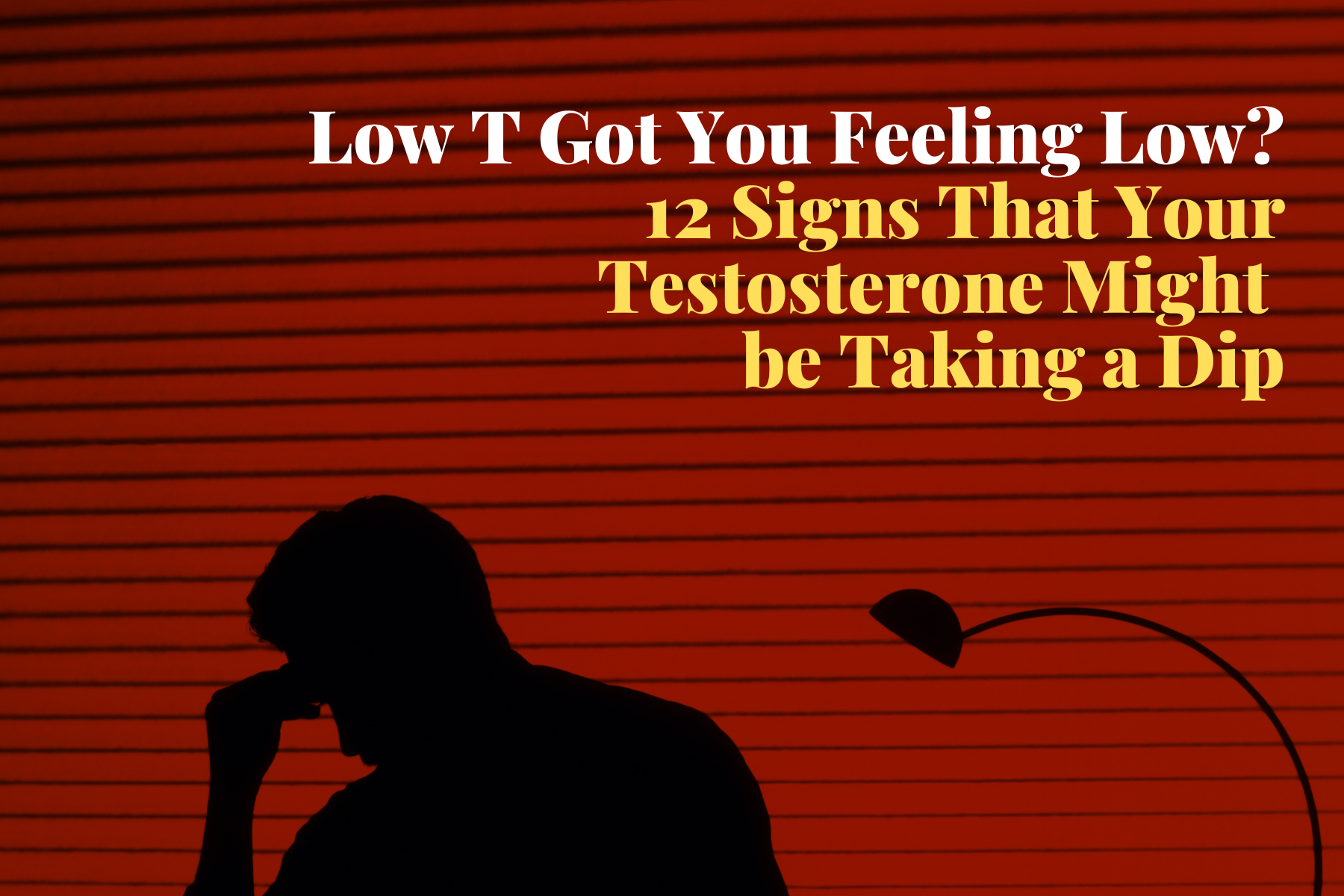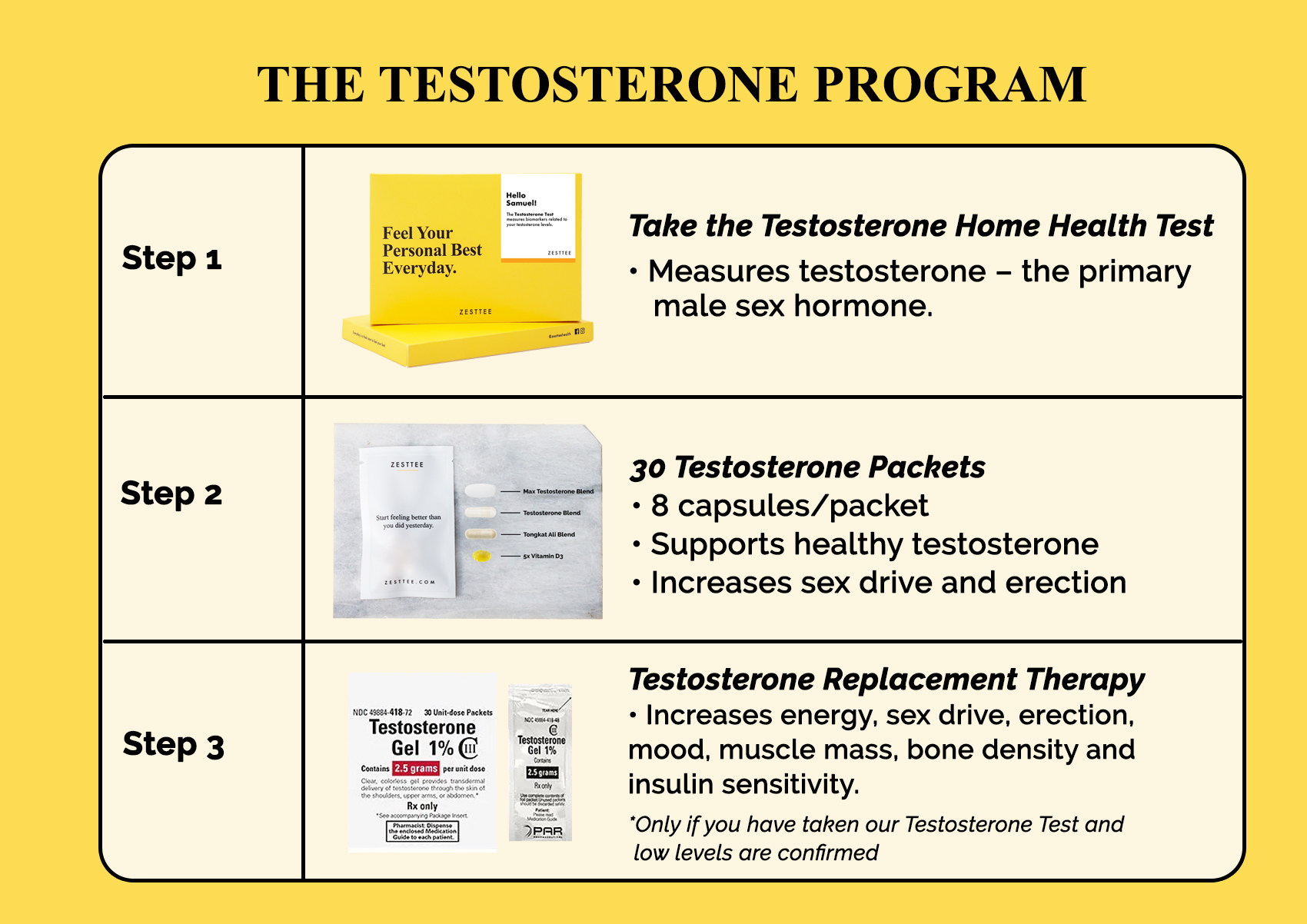CATEGORY: BOOST TESTOSTERONE
Low T Got You Feeling Low? 12 Signs That Your Testosterone Might be Taking a Dip

As men age, their testosterone levels naturally decline, and this can have a range of effects on their health and well-being. While testosterone decline is a natural part of the aging process, it's important to be aware of the signs of low testosterone so you can take steps to manage the symptoms.
So, how do you know if your testosterone is taking a dip? Here are 12 common signs to look out for:
1. You're more tired than usual, even after a good night's sleep.
2. Your sex drive has gone from a roaring fire to a smoldering ember.
3. You're experiencing erectile dysfunction - and not the good kind.
4. You're losing muscle mass despite hitting the gym on the regular.
5. Your body fat is starting to accumulate in places it never used to, like your beer belly.
6. Your mood has gone from sunny to stormy, and your partner is walking on eggshells around you.
7. You're having trouble concentrating and your memory is starting to fail you.
8. Your hairline is receding faster than your hair can keep up.
9. You're experiencing hot flashes and night sweats, and it's not just because you're going through "man-opause".
10. Your bones are starting to feel more brittle and you're more prone to fractures.
11. You're experiencing an increase in body hair - but not the kind you're excited about.
12. Your voice has lost some of its deep, resonant quality and you're starting to sound like a prepubescent boy.
Can Low T Lead to Low Fertility? Understanding the Link Between Low Testosterone and Infertility
As a man, your testosterone levels play a crucial role in your overall health and well-being. Not only does testosterone impact your muscle mass, sex drive, and mood, but it also plays a key role in your fertility. So, if you're experiencing symptoms of low testosterone, it's important to consider the potential impact on your fertility as well.
Low testosterone, also known as hypogonadism, can have a range of negative effects on male fertility. Testosterone is essential for the production of sperm, so when testosterone levels are low, it can lead to a decrease in sperm count and poor sperm quality. This can make it more difficult to conceive with a partner, and can even increase the risk of birth defects if a pregnancy is successful.
But what are the signs of low testosterone that might impact your fertility? Here are a few to look out for:
1. Decreased sex drive - If you're not feeling as interested in sex as you used to be, it could be a sign of low testosterone levels.
2. Erectile dysfunction - Difficulty getting or maintaining an erection can be a symptom of low testosterone, and can also impact your ability to conceive with a partner.
3. Decreased semen volume - If you've noticed a decrease in the amount of semen you're producing, it could be a sign of low testosterone levels.
4. Low sperm count - If you've been trying to conceive with a partner without success, low sperm count could be a contributing factor.
5. Abnormal sperm morphology - Poor sperm quality, including abnormal sperm shape and movement, can also be a sign of low testosterone levels.
While lifestyle changes can help improve testosterone levels and fertility, some men may also turn to supplements as a way to support their overall health and well-being. Here are a few supplements that have been linked to increased testosterone levels and improved fertility:
1. DHEA - DHEA is a hormone produced by the adrenal glands that can be converted into testosterone in the body. Studies have shown that supplementing with DHEA can lead to increased testosterone levels and improved fertility in men with low testosterone levels.
2. Zinc - Zinc is an essential mineral that plays a role in testosterone production and sperm health. Studies have shown that supplementing with zinc can increase testosterone levels and improve sperm count and motility.
3. Vitamin D - Vitamin D is a fat-soluble vitamin that is important for overall health and well-being. Studies have shown that men with low levels of vitamin D may have lower testosterone levels and a higher risk of infertility. Supplementing with vitamin D may help improve both testosterone levels and fertility.
4. Ashwagandha - Ashwagandha is an herb commonly used in traditional medicine to improve overall health and vitality. Studies have shown that supplementing with ashwagandha can lead to increased testosterone levels and improved sperm quality.
5. Tribulus terrestris - Tribulus terrestris is a plant commonly used in traditional medicine to improve male fertility and sexual function. Studies have shown that supplementing with tribulus terrestris can lead to increased testosterone levels and improved sperm count and motility.
While these supplements may be helpful for some men with low testosterone and infertility, it's important to talk to your healthcare provider before starting any new supplement regimen. They can help you determine the appropriate dosages and monitor for any potential side effects or interactions with other medications. Additionally, supplements should not be used as a substitute for other forms of treatment, such as testosterone replacement therapy or fertility treatments, if they are deemed necessary by your healthcare provider.


